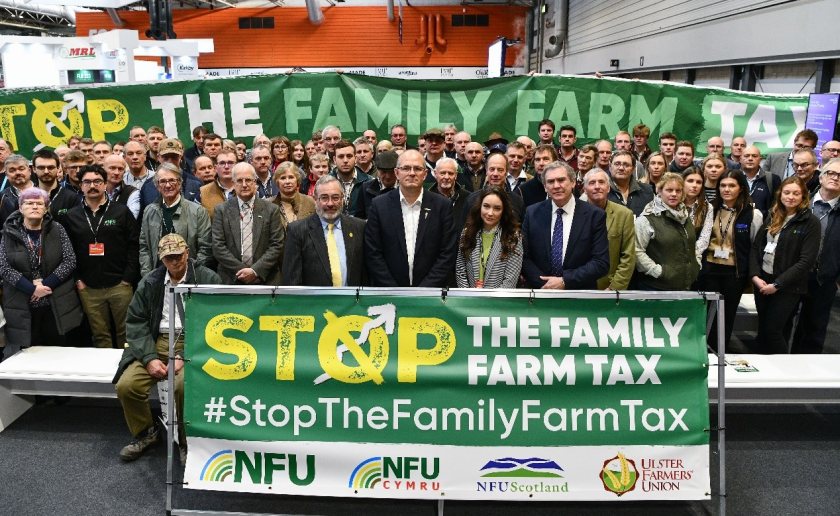
Farm leaders have met with Treasury ministers today to seek solutions to the government's 'disastrous' inheritance tax proposals, but officials showed 'no enthusiasm' for any changes.
Numerous industry bodies attended discussions with Exchequer Secretary James Murray on Tuesday (18 February) to go over the controversial changes.
The meeting included the NFU, the Tenant Farmers Association, Country Land and Business Association and Central Association of Agricultural Valuers.
The organisations presented a 'clawback' alternative as a way of mitigating some of the consequences of the policy, which was announced in the autumn budget.
However, the groups said the government "showed no enthusiasm or appetite for compromise".
From April 2026, the 100% rate of tax relief will continue for the first £1m of combined agricultural and business assets, with a reduced rate of relief of 50% for amounts above this threshold.
At the meeting earlier today, the industry bodies suggested retaining 100% agricultural and business property reliefs for qualifying assets.
However, inheritance tax would be applied to these assets if sold within a certain time period post-death, payable out of the proceeds of sale.
The groups said they expected this could generate a similar figure to what the government claims its own policy of capping vital inheritance tax reliefs for farms and family businesses would achieve, and is calling on the Office for Budget Responsibility to model the proposal.
However, CLA President Victoria Vyvyan said the Treasury was "simply going through the motions and showed no interest in farming or family businesses".
She said: “The CLA could not have made the facts clearer to the Treasury: this inheritance tax policy is already inflicting damage on the economy and is likely to end up hitting tax revenues.
“The chancellor has previously asked for solutions, we have presented a compelling alternative but the government is deaf to the possibility.
The clawback alternative that was proposed could limit the damage to businesses, according to the four organisations.
It would allow rural and other family businesses to continue to make medium and long-term investment decisions, unlocking the stalled growth in business investment in the rural economy and keeping land in production.
The plan would also target those who have bought land to shelter wealth for short-term gain, and would still deliver revenue that the Treasury needs.
Ms Vyvyan said: “We will carry on campaigning against the current disastrous policy, and the government has to work with us and commit to finding a solution in time for the spring statement.”
The groups believe that other alternatives, such as transferability of the £1m APR/BPR allowance or a relaxation of the seven-year rule on gifting, would not be enough to help businesses or address the shortcomings of the current policy.
The Farmers' Union of Wales (FUW) president, Ian Rickman said he was 'deeply disappointed' by the Treasury's 'dismissive response'.
"Together with other UK farming unions, we clearly outlined the potential economic, emotional and cultural devastation these changes could inflict on farms," he said.
"Crucially, we offered our willingness to collaborate with the government and industry stakeholders to address the flaws in this ill-thought-out policy.
"Regrettably, it seems these arguments have fallen on deaf ears. We continue to hold grave concerns about these changes, and will liaise further with our membership regarding the best way forward.”
NFU president Tom Bradshaw, who was in parliament meeting MPs last week and speaking at a farmer rally in Westminster, added: “Disappointed doesn’t cover how I feel after this meeting.
"We have repeated our concerns about the impact on farming families; they don’t care. On the impact on families who can’t afford vast tax bills coming their way on the death of a loved one; they don’t care.
"On the elderly – the most vulnerable people in our farming community – who feel they are now a burden on their family; they don’t care.
“This morally bankrupt position sits with this government, and, without change, ministers will reap the consequences."
In other IHT news, the entire UK food manufacturing industry joined forces last week to urge the government to rethink its changes.
A total of 57 businesses across the food supply chain, including all of the UK's major supermarkets and major food processors, voiced their concern in a new letter.
The NFU is also set to 'bring to life' the effect of the proposals with a display of agricultural machinery and toy tractors outside its conference in London on 25 February.
The union is asking for donations of 'pre-loved' farm toys and other agricultural memorabilia as part of its ongoing campaign to stop Labour's 'family farm tax'.
Today's meeting will be followed by another round of discussions with the Treasury, including NFU Cymru, NFU Scotland and the Ulster Farmers’ Union.
